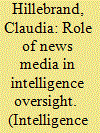| Srl | Item |
| 1 |
ID:
108624


|
|
|
|
|
| Publication |
2011.
|
| Summary/Abstract |
This article explores the official cover up of the mysterious disappearance of naval frogman Lionel Buster Crabb in 1956. Existing histories of the affair have tended to focus on the manner of Crabb's death, advancing a series of plausible and suitably implausible explanations. Using recently declassified sources, this article, in contrast, seeks to use the Crabb affair as a window onto government secrecy and relations between the press and the intelligence services. It is argued that the affair was a climacteric for the intelligence community and its relationship with Fleet Street, rupturing long-standing taboos about secret service work and bringing to the fore a brand of investigative journalist determined to make front-page news of intelligence shortcomings and failure.
|
|
|
|
|
|
|
|
|
|
|
|
|
|
|
|
| 2 |
ID:
116165


|
|
|
|
|
| Publication |
2012.
|
| Summary/Abstract |
This article explores the role of the news media in overseeing intelligence services and their work. As an informal mechanism, how do they fit into the wider landscape of intelligence oversight? By drawing on examples of US counter-terrorism efforts in the post-9/11 era, the article identifies three roles for the news media in intelligence oversight: as an information transmitter and stimulator for formal scrutinizers, as a substitute watchdog and as a legitimizing institution. Yet there is a danger of the news media acting merely as a lapdog. Other limitations include the impact of regulatory frameworks, government secrecy and the media strategies of intelligence services. The article concludes that the news media play an important role in the wider intelligence oversight landscape, but that their ability to scrutinize is uneven and ad hoc and as a result the picture they produce is blurred.
|
|
|
|
|
|
|
|
|
|
|
|
|
|
|
|